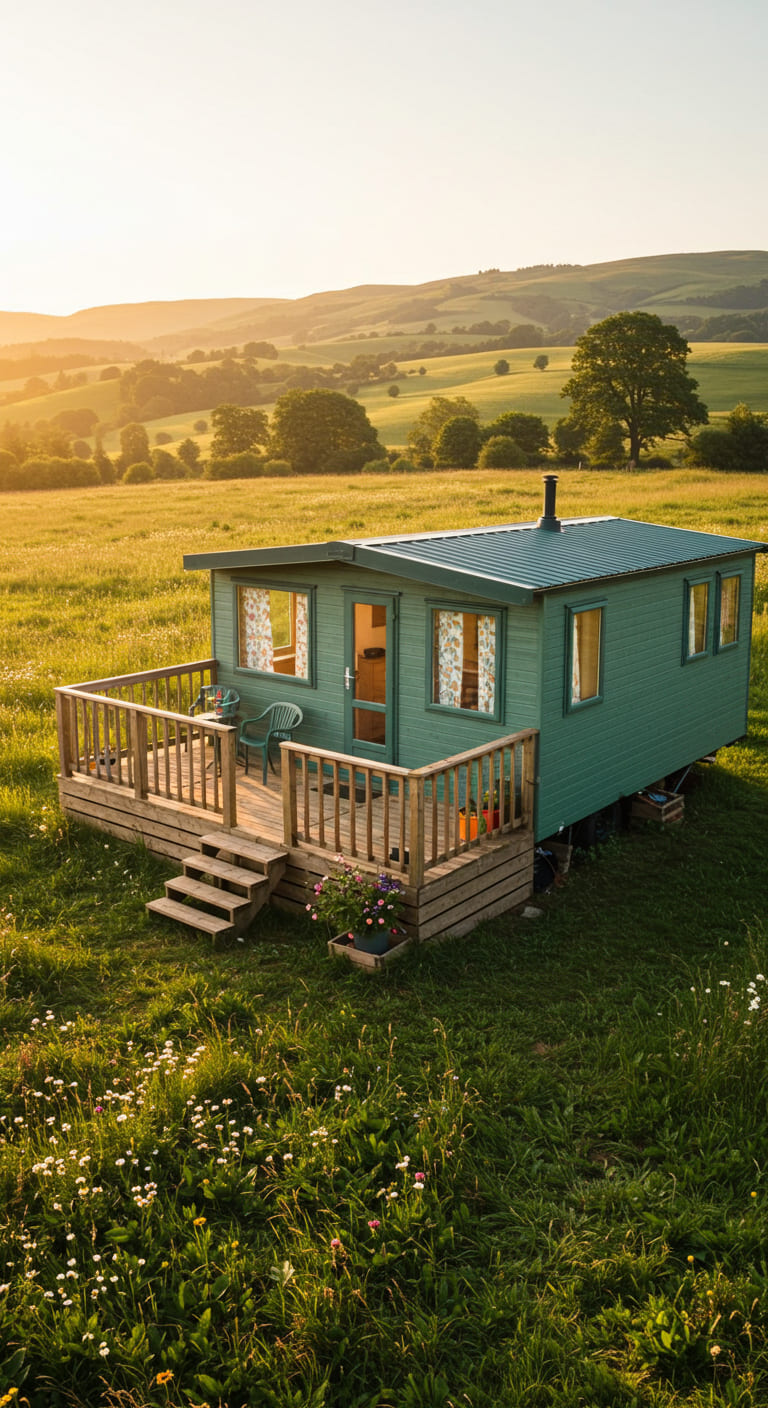When I first began my journey to find the perfect home, I was overwhelmed by the multitude of options available. From traditional houses to modern trailers, the choices seemed endless. Each option came with its own set of advantages and disadvantages, making my decision all the more challenging. As I delved deeper into the nuances of both houses and trailers, I discovered that the differences were not just about size or shape, but also about lifestyle, financial implications, and personal values. In this article, I will share my insights and experiences as I explore the key differences between a house and a trailer, helping you discover which option might be your perfect home.
Understanding the Basics: What is a House?
When we think of a house, we often envision a traditional structure built on a permanent foundation. Houses come in various styles, sizes, and configurations, but they generally share certain characteristics:
- Permanent structure
- Typically built on a concrete foundation
- Variety of architectural styles (ranch, colonial, modern, etc.)
- Usually includes multiple rooms, bathrooms, and a kitchen
- Often located in residential neighborhoods
Houses are often seen as a long-term investment. According to the National Association of Realtors, the median price of existing homes in the United States was around $350,000 in 2021, and home values have shown steady appreciation over the years. This makes buying a house not only a place to live but also a significant financial decision.
Understanding the Basics: What is a Trailer?
On the other hand, trailers—often referred to as mobile homes or manufactured homes—offer an entirely different living experience. Here’s a quick overview of what defines a trailer:
- Manufactured in a factory and transported to a site
- Typically less expensive than traditional houses
- Can be moved if necessary (though not always practical)
- Available in various sizes and layouts
- Often located in trailer parks or mobile home communities
Trailers have been gaining popularity for various reasons, including affordability and flexibility. According to the Manufactured Housing Institute, around 22 million Americans live in manufactured homes, making them an essential part of the housing landscape.
Cost Comparison: Houses vs. Trailers
One of the most significant factors in deciding between a house and a trailer is the cost. Here’s what I found during my research:
- Initial Purchase Price: On average, trailers can cost about 50% less than traditional houses. A new manufactured home can range from $40,000 to $100,000, while a standard house often exceeds $300,000.
- Maintenance Costs: Houses typically require more maintenance due to their permanent structures, roofs, and landscaping. Trailers may have lower upkeep but can suffer from depreciation.
- Utilities and Insurance: Utility costs can vary significantly. Homes may have higher utility bills due to larger space, while trailers can be more energy-efficient. Insurance costs also differ, with trailers often requiring specialized coverage.
Understanding these costs helped me weigh my options carefully. It’s essential to consider not just the purchase price but the long-term financial implications as well.
Space and Layout: A Crucial Consideration
When I began envisioning my ideal living space, the layout was paramount. Here’s how houses and trailers compare:
- Space: Traditional houses generally offer more square footage, which allows for larger families and more storage. Trailers, while compact, maximize space efficiently through clever designs.
- Room Count: Houses often feature multiple bedrooms, bathrooms, and living spaces, whereas trailers may have fewer rooms but can still offer comfortable living arrangements.
- Outdoor Space: Houses typically come with yards, gardens, and outdoor areas. In contrast, trailers may have limited outdoor space, especially if located in a mobile home park.
Ultimately, the choice between a house and a trailer will depend on your personal preferences, whether you prioritize space or flexibility.
Location, Location, Location: Where Will You Call Home?
One of the most critical factors in my decision-making process was location. The area I wanted to live in greatly influenced my options:
- Houses: Often located in suburban or urban neighborhoods, houses provide a sense of community and proximity to amenities like schools, parks, and shopping centers.
- Trailers: These can be found in mobile home parks, rural areas, or even as standalone units. While they can offer a sense of freedom and space, they may lack the community feel of a neighborhood.
As I considered my lifestyle and preferences, I found that location played a vital role in determining my ideal living situation.
Lifestyle and Community: What Do You Value?
Another essential aspect to consider is the lifestyle associated with each option. Here’s what I learned about lifestyle differences between houses and trailers:
- Community Involvement: Living in a traditional neighborhood often fosters a sense of community, with neighbors looking out for one another and engaging in local events.
- Freedom and Flexibility: Trailers offer a more mobile lifestyle, allowing residents to relocate without the hassle of selling a property. This can be appealing for those who value travel or adventure.
- Maintenance Responsibilities: Homeownership often comes with a greater burden of maintenance and repairs. In contrast, trailers may require less upkeep, enabling a more carefree lifestyle.
Ultimately, the lifestyle that resonates with you will heavily influence your decision between a house and a trailer.
Environmental Impact: Sustainability Considerations
As I became more conscious of my environmental footprint, the sustainability of my living situation became increasingly important. Here’s how houses and trailers stack up:
- Energy Efficiency: Newer trailers are often designed with energy efficiency in mind, utilizing modern materials and technologies to reduce energy consumption.
- Land Use: Houses may require more land, contributing to urban sprawl. Trailers, particularly in mobile home parks, can utilize smaller plots more effectively.
- Construction Materials: The construction process for trailers can be more efficient, using fewer materials and producing less waste compared to traditional houses.
Understanding the environmental implications of my housing choice added another layer to my decision-making process.
Financing Your Home: What You Need to Know
Financing is a significant consideration when purchasing a house or trailer. Here’s what I discovered:
- Mortgage Options: Traditional houses are often financed through conventional mortgages, which can have favorable interest rates. In contrast, trailers may require different financing options such as chattel loans.
- Down Payments: The down payment required for a house is typically higher, often ranging from 10% to 20%. Trailers may require less upfront investment, making them more accessible for first-time buyers.
- Loan Terms: Mortgages for houses can span 15 to 30 years, while loans for trailers may have shorter terms, affecting monthly payments and long-term financial planning.
Understanding the financial landscape helped me make a more informed decision about which option was more feasible for my situation.
Resale Value: What to Expect in the Future
As I contemplated my long-term plans, the resale value of my potential home became a crucial factor. Here’s what I learned:
- Houses: Traditionally, houses appreciate over time, building equity and providing a return on investment. According to Zillow, the average home appreciates about 3% annually.
- Trailers: Unfortunately, trailers tend to depreciate in value, similar to vehicles. This makes them less favorable as long-term investments.
- Market Trends: The housing market can fluctuate, affecting resale values for both houses and trailers. However, houses generally have a more stable market presence.
Understanding these dynamics allowed me to consider not just where I wanted to live now, but also where I might want to be in the future.
Emotional and Personal Connection: Where Do You Feel at Home?
After researching the financial, environmental, and lifestyle aspects, I realized that the emotional connection to a home is equally important. Here’s how I viewed it:
- Sense of Belonging: A house often provides a sense of permanence and community, fostering a deep emotional connection.
- Adventure and Freedom: Trailers allow for spontaneity and adventure, appealing to those who value experiences over material possessions.
- Personalization: Both houses and trailers can be personalized, but the degree of customization may differ based on the structure.
Ultimately, where I felt most at home dictated my final decision.
Conclusion: Finding Your Perfect Home
In my quest to discover the difference between a house and a trailer, I uncovered a wealth of information that profoundly impacted my decision-making process. Each option presents unique advantages and challenges, catering to different lifestyles, budgets, and values. Whether you lean towards the permanence and stability of a house or the flexibility and affordability of a trailer, understanding these differences is crucial for making an informed choice.
To summarize, here are the key takeaways:
- Houses offer more space and potential for appreciation, while trailers provide affordability and mobility.
- Cost, location, lifestyle, and environmental impact are essential factors to consider in your decision.
- The emotional connection to a home plays a significant role in determining where you truly feel at home.
I encourage you to take the time to reflect on your personal preferences and values as you navigate your housing journey. Whichever path you choose, remember that the perfect home is one that aligns with your lifestyle and aspirations.
FAQs
What is the primary difference between a house and a trailer?
The primary difference lies in their construction and permanence. Houses are built on a permanent foundation, while trailers are manufactured off-site and can be moved.
Are trailers a good investment?
While trailers can be significantly less expensive than houses, they may depreciate in value, making them less favorable as long-term investments compared to traditional homes.
Can I customize a trailer like a house?
Yes, trailers can be customized to a certain extent, but the degree of personalization may differ from traditional houses.
What are the financing options for trailers?
Trailers may require different financing options, such as chattel loans, which are specifically designed for movable homes.
If you found this article useful, I invite you to sign up for our newsletter for more insights on housing options and lifestyle tips. Share this article with friends and family on social media! Your journey to finding the perfect home begins now.
Jack Boss 3 Ton Low Profile, Aluminum and Steel Racing Floor Jack with Dual Pistons Quick Lift Pump for Sport Utility Vehicle, Lifting Range 3-15/16" min to 18-5/16" max, Net Weight 58.5 lb, Red
$179.99 (as of November 17, 2025 07:55 GMT -03:00 - More infoProduct prices and availability are accurate as of the date/time indicated and are subject to change. Any price and availability information displayed on [relevant Amazon Site(s), as applicable] at the time of purchase will apply to the purchase of this product.)
Sign up for our newsletter and stay up to date with exclusive news
that can transform your routine!





